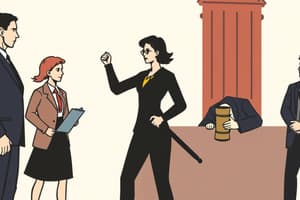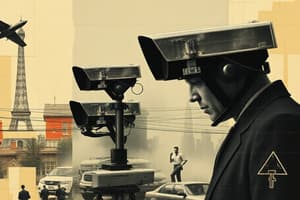Podcast
Questions and Answers
What determines if a controversy between parties warrants judicial intervention?
What determines if a controversy between parties warrants judicial intervention?
The court determines if there is sufficient immediacy and reality.
A controversy is considered ripe before an agency's decision is formalized.
A controversy is considered ripe before an agency's decision is formalized.
False (B)
What does mootness refer to in United States law?
What does mootness refer to in United States law?
- Legal proceedings that can still have an effect
- A matter that has practical significance
- A matter deprived of practical significance (correct)
- A desirable outcome in court
What does Amicus Curiae mean?
What does Amicus Curiae mean?
What is the purpose of a writ of certiorari?
What is the purpose of a writ of certiorari?
What is a concurring opinion?
What is a concurring opinion?
What defines a majority opinion in law?
What defines a majority opinion in law?
What is a dissenting opinion?
What is a dissenting opinion?
What is Federalist 51 about?
What is Federalist 51 about?
How did Madison view factions?
How did Madison view factions?
How are interest groups often biased?
How are interest groups often biased?
Which of the following describes originalism in judicial interpretation?
Which of the following describes originalism in judicial interpretation?
What is the most common way for a case to reach the Supreme Court?
What is the most common way for a case to reach the Supreme Court?
What is a valence issue?
What is a valence issue?
What is a position issue?
What is a position issue?
Define polarization.
Define polarization.
What does sorting refer to in politics?
What does sorting refer to in politics?
What are latent issues?
What are latent issues?
Explain rational ignorance.
Explain rational ignorance.
What are heuristics?
What are heuristics?
What does going public refer to?
What does going public refer to?
Define priming in political communication.
Define priming in political communication.
What is framing in media?
What is framing in media?
What is Duverger's Law?
What is Duverger's Law?
State the median voter theorem.
State the median voter theorem.
What is issue voting?
What is issue voting?
Explain rational abstention.
Explain rational abstention.
What is resource bias?
What is resource bias?
Describe party ID's role in vote choice.
Describe party ID's role in vote choice.
What is a primary election?
What is a primary election?
Why are political parties considered weak?
Why are political parties considered weak?
Mobilization refers to the deployment of resources for __________.
Mobilization refers to the deployment of resources for __________.
What is collective responsibility?
What is collective responsibility?
What does individual responsibility entail?
What does individual responsibility entail?
Describe the tension between collective and individual responsibility.
Describe the tension between collective and individual responsibility.
What is the relationship between party leadership and elected officials?
What is the relationship between party leadership and elected officials?
Define economic groups.
Define economic groups.
What is an interest group?
What is an interest group?
What is a political group?
What is a political group?
What are issue groups?
What are issue groups?
Define non-political groups.
Define non-political groups.
What is selective benefits?
What is selective benefits?
Who are political entrepreneurs?
Who are political entrepreneurs?
What is the exploitation of the great by the small?
What is the exploitation of the great by the small?
Define pluralism.
Define pluralism.
What is direct lobbying?
What is direct lobbying?
What is the Supreme Court?
What is the Supreme Court?
Define district court.
Define district court.
What are appellate courts?
What are appellate courts?
Define judicial review.
Define judicial review.
What was the significance of Marbury v. Madison?
What was the significance of Marbury v. Madison?
What is senatoral courtesy?
What is senatoral courtesy?
Describe the Judiciary Committee.
Describe the Judiciary Committee.
What happened during the Saturday Night Massacre?
What happened during the Saturday Night Massacre?
Who was Robert Bork?
Who was Robert Bork?
Define originalism.
Define originalism.
What is judicial restraint?
What is judicial restraint?
What is judicial activism?
What is judicial activism?
Define ripeness in law.
Define ripeness in law.
Flashcards are hidden until you start studying
Study Notes
Political Issues
- Valence Issue: Political issues generally agreed upon by voters, such as community prosperity. The focus lies on which party can best achieve this goal.
- Position Issue: Political debates where parties have opposing views, contrasting with valence issues where consensus exists.
Ideological Dynamics
- Polarization: Increased ideological divisions between political parties and a greater ideological consensus within parties.
- Sorting: Rising consistency and uniformity within political groups on shared ideas.
Voter Behavior
- Latent Issues: Opinions formed spontaneously in response to specific situations, contrasting with stable, deeply held opinions.
- Rational Ignorance: Choosing not to acquire knowledge about issues when the costs outweigh the benefits of that knowledge.
- Heuristics: Cognitive shortcuts used by voters in decision-making regarding candidates.
Political Strategies
- Going Public: Strategy by presidents to appeal directly to voters to pressure Congress into passing desired legislation, especially in a divided government.
- Priming: Media emphasis on specific characteristics influencing public perceptions of people or issues.
- Framing: Media highlighting particular aspects of a news story, shaping public perception through selective emphasis.
Electoral Systems
- Duverger's Law: Principle stating that plurality rule elections in single-member districts tend to create a two-party system.
- Median Voter Theorem: Majority rule systems tend to reflect the preferences of the median voter, limiting divergence from their views.
Voting Behavior
- Issue Voting: Voters make choices based on political issues, comparing candidates' principles to their own beliefs.
- Rational Abstention: Deliberate choice to refrain from voting when the perceived benefits do not justify the effort.
Political Parties
- Weakness of Parties: Political parties are becoming weaker due to reforms and the rise of primary elections that diminish party control over candidates.
- Reasons for Party Formation: Facilitate collective action in elections, resolve collective choice issues, and manage political ambition.
Political Mobilization
- Mobilization: Deployment of resources to achieve specific political goals, including mobilizing voters and party members.
- Roles of Parties: Parties work to motivate potential voters to help candidates win elections.
Government Accountability
- Collective Responsibility: Cabinet members must publically support government decisions, risking collective resignation if unable to do so.
- Individual Responsibility: Ministers are accountable for their departmental actions and may resign for failures, while the larger governing body is not blamed.
Political Groups
- Economic Group: Organizations that lobby for government policies benefiting their members economically.
- Interest Group: Collective of individuals united by common political goals to influence government decisions.
- Political Group: Ideologically aligned groups seeking government control to promote their policies.
- Issue Group: Focus on specific concerns, such as abortion or animal rights, characterized by intense lobbying efforts.
Judicial System
- Supreme Court: Highest court in the U.S. judicial system with authority over federal and certain state issues.
- District Court: General trial courts of the federal system handling civil and criminal cases.
- Appellate Courts: Courts where decisions from district courts can be appealed, comprising multiple judges who review cases.
- Judicial Review: The Supreme Court's power to determine the constitutionality of laws.
- Marbury v Madison: Landmark case establishing judicial review and expanding the Court’s political influence.
Judicial Processes
- Senatorial Courtesy: Custom allowing senators to block appointments by raising objections, particularly for nominees from their states.
- Judiciary Committee: Congressional committee overseeing federal courts and law enforcement.
Legal Concepts
- Mootness: A case deemed moot has lost practical significance, deterring judicial consideration.
- Ripeness: Requirement that a case has matured into a justiciable controversy, allowing a court to hear the case.
Legal Documents
- Amicus Curiae Brief: A document submitted by non-parties with a strong interest in influencing a court's decision.
- Writ of Certiorari: Supreme Court order to review lower court records in a case.
Judicial Opinions
- Concurring Opinion: A judge’s agreement with the majority decision but providing different reasoning.
Additional Concepts
- Rational Ignorance: Decision not to acquire knowledge about issues due to cost-benefit evaluations.
- Political Entrepreneurs: Individuals who initiate new political endeavors for personal or group benefits.
Collective Action
- Exploitation of the Great by the Small: Concept from collective action theory, highlighting challenges groups face in providing public goods efficiently, encouraging free-riding behavior.
Political Theory
- Pluralism: Theory advocating for diverse, competing centers of power in society, promoting a marketplace of ideas in governance.### Judicial Opinions
- Majority Opinion: A judicial opinion agreed upon by over half of court members, outlining the court's decision and rationale. Not all cases produce majority opinions.
- Dissenting Opinion: A statement by one or more judges expressing disagreement with the majority opinion, providing an alternative legal perspective.
Madison's Political Philosophy
- Federalist No. 51: Advocates for checks and balances and separation of powers in government. Emphasizes that "Ambition must be made to counteract ambition."
- Federalist No. 10: Discusses guarding against factions—groups with interests contrary to the rights of others or the community’s welfare. Madison believed a unified republic counteracts these dangers better than smaller republics.
- Factions and Property: Madison argues that differences in ideology and religion can form factions, but the primary driver is the unequal accumulation of property. Men’s natural inequalities lead to disparities in wealth.
- Controlling Factions: Madison proposes controlling the effects of factions through a Republican government to prevent tyranny of the majority over minority rights. A well-informed elected representative can better serve the public good.
Factions vs. Groups
- Definition of Factions: Groups united by common political causes or interests, distinct from factions which may focus on single issues or economic benefits.
- Madison's Concern: Factions can threaten the integrity of a republic, especially smaller ones. A strong national government can mitigate these risks.
- Democracy vs. Republic: While pure democracy can suppress minority factions, a republic safeguards against this by electing knowledgeable representatives.
Interest Group Bias
- Upper-Class Bias: Interest groups are often reflective of upper-class interests, as wealthier individuals are more likely to join. Business and professional groups tend to be more prevalent and financially robust.
- Group Bias: Interest groups may align with or oppose opinions simply based on group membership, leading to biases in representation.
Schools of Judicial Interpretation
- Originalism: Interpreting laws based on their original meaning at the time of enactment.
- Judicial Restraint: Limiting judicial power, advocating for deference to legislative authority.
- Textualism: Focusing on the text of the Constitution to guide judicial decisions.
- Strict Constructionism: Interpreting laws literally based on the written text.
Supreme Court Case Progression
- Path to the Supreme Court: Most cases reach the Supreme Court via appeals from circuit courts, often initiated by filing for a writ of certiorari.
- Case Requirements: Typically requires federal jurisdiction, starting in district court, potentially moving to appellate courts before reaching the Supreme Court.
Studying That Suits You
Use AI to generate personalized quizzes and flashcards to suit your learning preferences.




